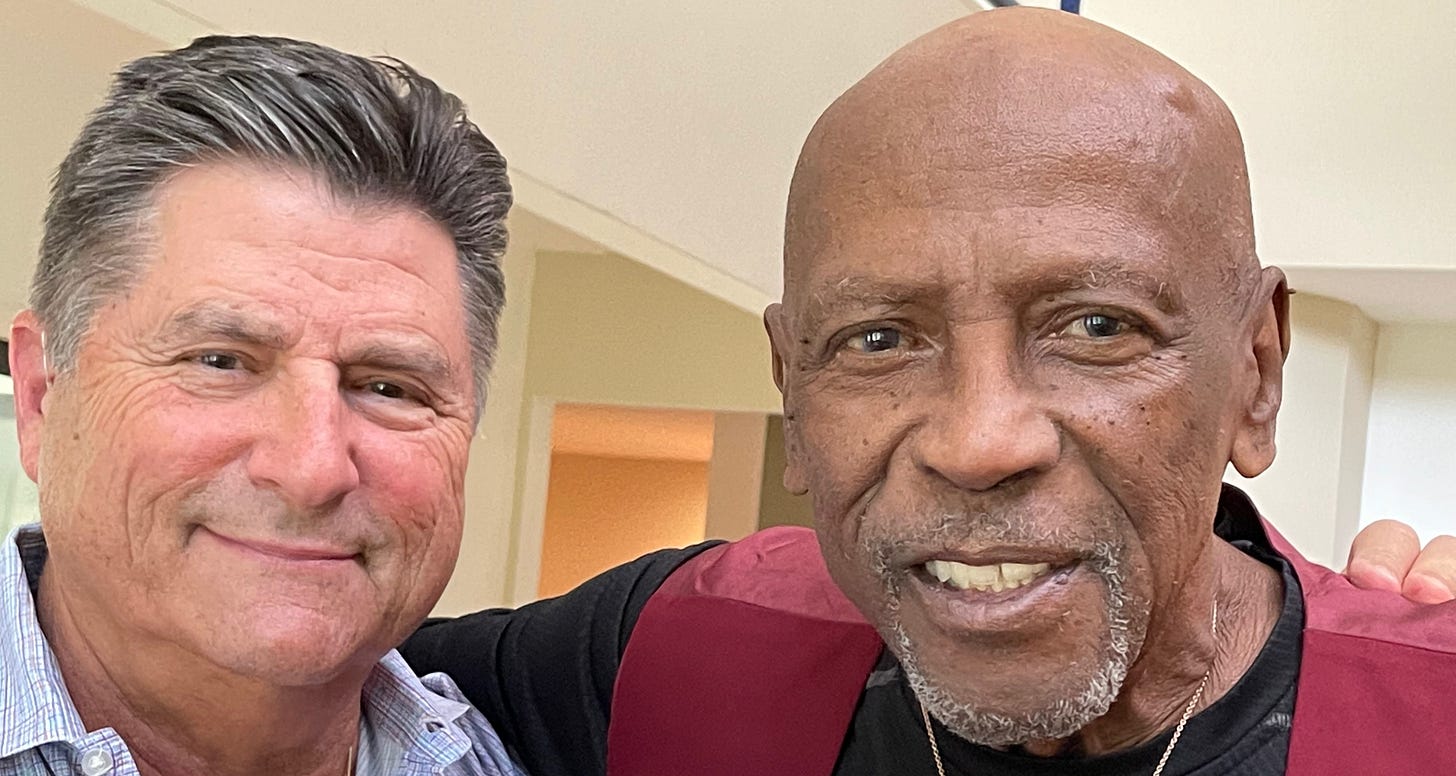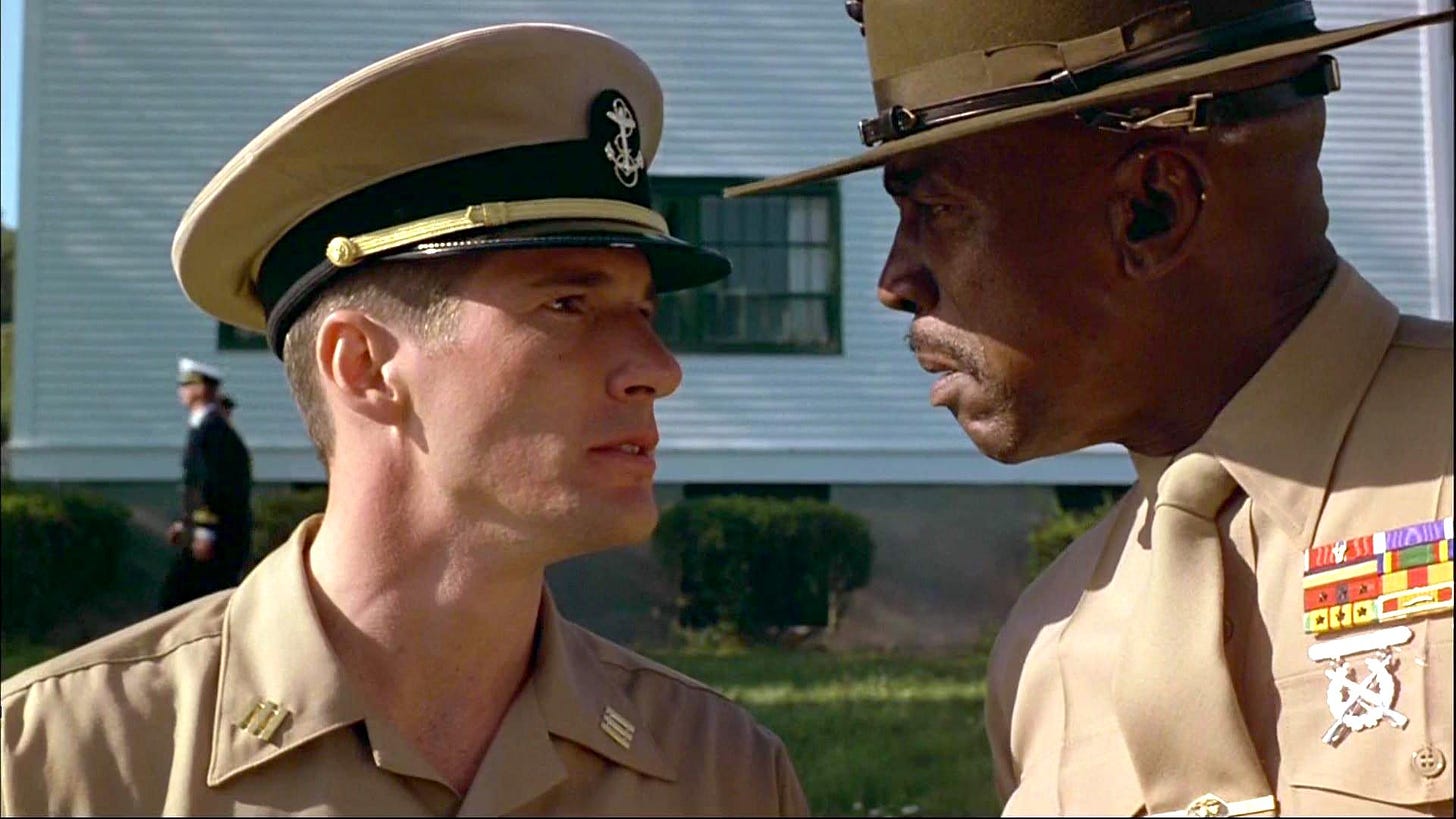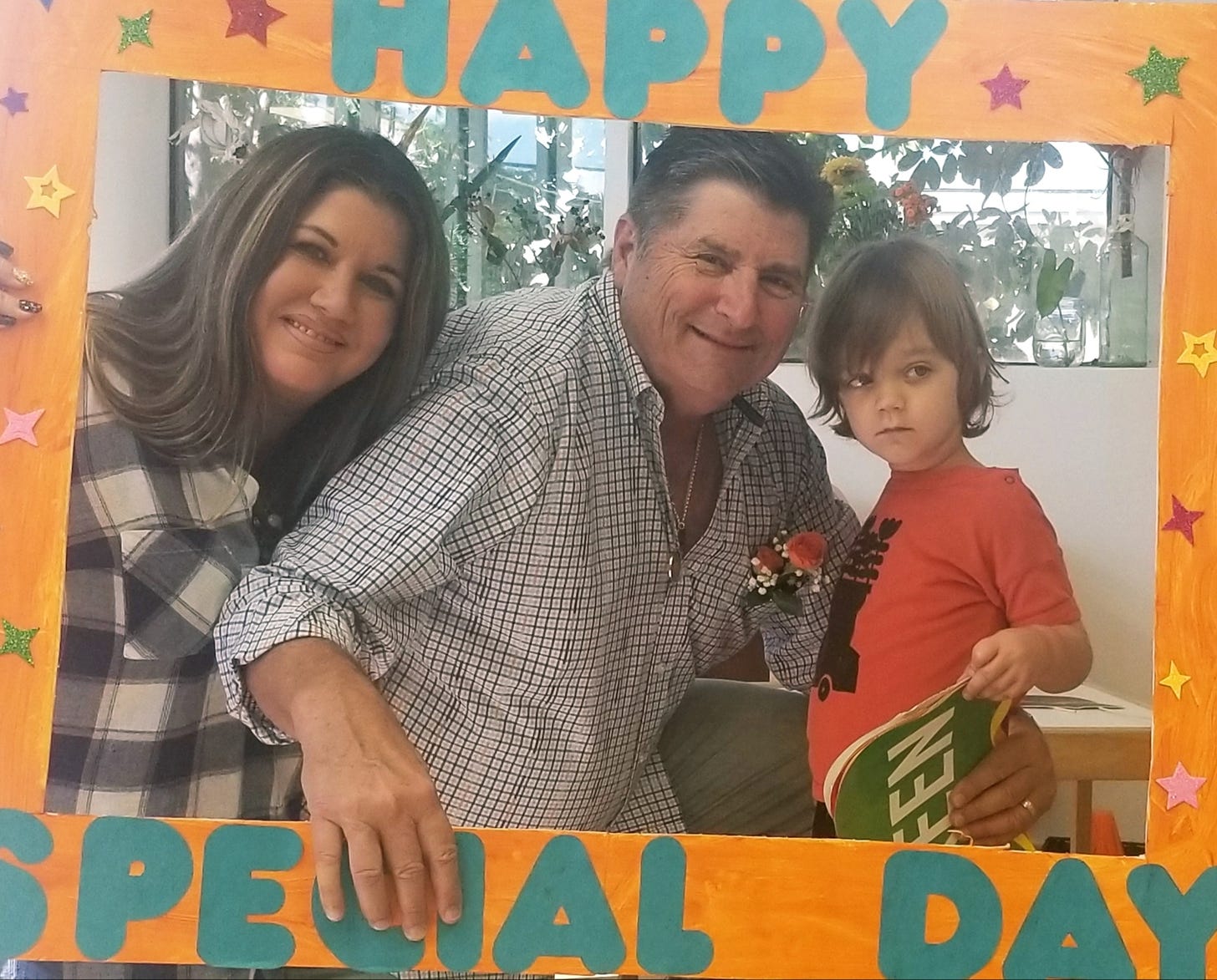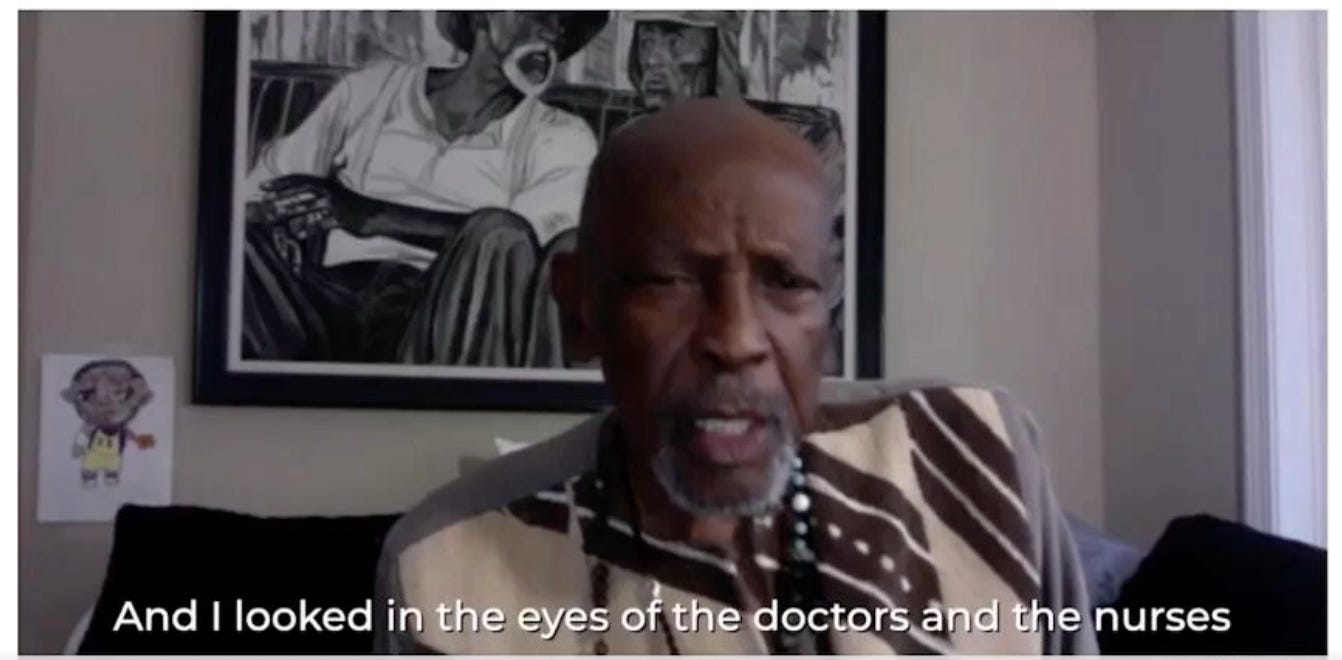Skip to comments.
How Ivermectin Saved Academy Award Winning Actor Louis Gossett Jr. from Dying of COVID-19
RESCUE ^
| 09/29/2021
| Peter Joffre Nye
Posted on 09/29/2021 9:35:13 PM PDT by SeekAndFind
When Academy Award-winning actor Louis Gossett Jr. walked out of an Atlanta hospital sick with COVID, he reached out to Florida Keys Dr. Bruce Boros, who would save his life.

Dr. Bruce Boros with Louis Gossett Jr. in Atlanta at Gossett’s 85th birthday party on May 27. “Any particular reason you want me to come up?” Boros asked when he got the invitation. “I wouldn’t be having a birthday party if you hadn’t saved my life,” Gossett replied.Academy Award-winner Louis Gossett Jr. is best remembered as the tall and straight-as-a-sword, old-school Marine Corps drill instructor in An Officer and a Gentleman, barking commands at fresh-faced Naval Officer aviation wannabee Zack Mayo (Richard Gere). Late last December, Gossett created national news for walking out of a suburban Atlanta hospital. Sick with COVID-19 for about a week, he’d spent two fearful days deteriorating on the COVID-19 ward. He didn’t want the ward’s walls to be the last thing he saw before dying.
“I watched the best doctors and nurses in the world doing all they could to help people sick with COVID,” he says in a telephone interview. “Doctors and nurses were stressed out from the strain of taking care of COVID patients and working long hours. I saw desperation in their eyes. My sense of security just left me.”
“The pandemic hit our country like a big bomb went off,” he adds. “I saw people dying in hospital beds. I thought I’m going to die with them. I could do better outside. I got out of bed and walked out of the hospital.”
His grown son, Satie Gossett, lived outside Atlanta and took him home on December 29, 2020—a day coinciding with a nationwide spike in the coronavirus, totaling 19.9 million people, and a reported 633,000 confirmed cases in Georgia, which topped 10,000 deaths. Gossett was home with no medical care. He was eighty-four years old with significant co-morbidities and getting sicker by the hour. The deadly inflammatory phase of COVID was blooming in his lungs.
Word of the aging actor’s dire health flashed around the entertainment industry, where he has been a leading player for decades and a mentor to young actors. His Facebook page received some 10,000 responses. Fans around the world prayed for the beloved figure, the first black actor in history to win an Academy Award as best supporting actor.
A native of the Brooklyn neighborhood home to actor Harvey Keitel and playwright Arthur Miller, Gossett grew to an imperial six-feet-four and was fast on his feet playing basketball. He earned a scholarship to play for New York University but subsequently left sports for theater. His credits include an Emmy Award for his 1977 role in Alex Haley’s miniseries Roots and, most recently, another Emmy in HBO’s nine-episode series Watchmen. He also founded the not-for-profit Eracism Foundation, dedicated to racial equality by fighting ignorance and apathy.
Now, with Gossett’s life at stake, his friends went into action. One of his protégés, Michele Shay, a Tony Award-nominated actress and a professor at the University of Southern California School of the Dramatic Arts in Los Angeles, learned that Gossett had walked out of the hospital because COVID-19 patients around him were dying. “I freaked out,” she says.
She called Jeremy Boros, a former student of hers at New York University’s Atlantic Theater Company who was now an aspiring actor and producer living in West Hollywood. Boros had been posting on Facebook, before vaccines were available, that his father, a prominent physician in the Florida Keys, was using an effective alternative medial therapy for treating patients with COVID-19: ivermectin. “I mentioned that my dad had been doing a lot of research about another drug that helped to treat COVID,” he says.
Shay asked Jeremy if his father could phone her friend, a famous actor who was in desperate need of help, and give him urgent medical care.

Louis Gossett Jr., starring in An Officer and a Gentleman, was the first black actor in history to win a supporting actor Academy Award, in 1983, for his portrayal of tough-as-nails Gunnery Sergeant Emil Foley, here giving life lessons to officer candidate Zack Mayo (Richard Gere).
Shay, an acclaimed actress in more than twenty productions, says she owed everything to Gossett. “Lou is responsible for my being an actress,” she says in a phone interview. “He literally coached me for my auditions for school at Carnegie Mellon University School of Drama and literally walked me to the audition. I had never been in a play before. He was the first person to tell me I had talent and he brought it out of me. I was terrified for Lou. He is a mentor and a beloved friend. So I put Lou in contact with Jeremy’s dad as quickly as I could.”
Jeremy’s father, board-certified cardiologist Dr. Bruce L. Boros, had been successfully treating COVID-19 patients with an ivermectin protocol that he had created in July 2020, one of the first doctors in the United States to aggressively use ivermectin for COVID.
Ivermectin is an FDA-approved anti-parasitic drug, often used to treat scabies and lice, with a forty-year history as one of the safest drugs in the world. The World Health Organization includes it on its list of a hundred “essential medicines.” In 2015 the Nobel Prize for Medicine went jointly to the drug’s discovers William Campbell, at Drew University in Madison, New Jersey; Satoshi Ōmura, at Kitasato University in Tokyo; and Tu Youyou of Traditional Chinese Medicine in Beijing.
Ivermectin is the generic name for Stromectol, developed in 1981 by pharmaceutical giant Merck. Its patent expired in 1996, and when Boros started his treatments the cost was about five dollars a pill in the U.S. and less than a dollar in the rest of the world. Ivermectin is also used to treat heartworm in dogs and worms and other parasites in horses, cattle, and livestock. But that is far overshadowed by its use in many evolving human illnesses that created its reputation among scientists as a wonder drug for humans, and led to the Nobel Prize for its wide benefit to humanity. In treating COVID-19, prescription ivermectin is administered along with vitamins, antibiotics, and steroids as needed.
Dr. Boros, seventy-one, stands an inch under six feet with a burly build. Miami-born and a second-generation medical doctor, he owns three urgent care centers ranging over 110 miles in the Florida Keys—in Key West, Marathon, and Key Largo—employing seventy medical staff. His care centers were taking a priority over his forty-year cardiology practice when the COVID-19 pandemic swept Florida. Waves of patients complained of fever, severe muscle and joint pain, and extreme difficulty breathing. As the main doctor on the island, he was asked to talk about COVID to the Key West city commission meeting on March 3, 2020, eight days before the WHO declared an official pandemic.
It was two months later, May 2020, when the federal government launched Operation Warp Speed to pursue public-private partnerships with pharmaceutical companies and accelerate the development, manufacture, and distribution of COVID-19 vaccines.
Boros felt the wait for the vaccines would be dangerous and lead to many deaths: “Doing nothing to help patients would be doing harm.”

Christina Boros, here with husband Dr. Bruce Boros and one of their grandchildren, spotted the Monash University study in Melbourne, Australia, demonstrating ivermectin’s role in killing the coronavirus in vitro
In April 2020, as COVID-19 dominated the daily news, Boros’s wife, Christina Boros, who had been doing ongoing research to help him, directed his attention to an article about a study from Monash University in Melbourne, Australia, that demonstrated ivermectin effectively killed the coronavirus in vitro.
In May 2020 Dr. Boros found a large observational study of 1,300 COVID-19 patients in the Dominican Republic published by the renowned cardiologist and internist Dr. José Natalio Redondo, involving clinical observations in three medical centers. The study reported that 99.3 percent of patients presenting COVID-19 symptoms recovered in the first five days with care that included ivermectin. Redondo also noted a marked reduction in the length of hospital stays and a profound reduction in deaths of patients on ventilators.
Dr. Boros called Dr. Redondo and had a lengthy conversation with the Dominican physician, who also has a home in Miami, because “I needed more information from the horse’s mouth.” Boros relates that Redondo told him, “They were having incredible success and tremendous results, with minimal side effects. Ivermectin has occasional uses in the United States, but it was a medication they had been using their entire lives in the Caribbean to treat parasitic diseases and knew how safe it was.”
Boros kept researching. “I felt compelled that if I’m going to run three urgent care centers, then I had to know a lot about COVID,” Dr. Boros says. “I had to become expert from prophylaxis to outpatient treatment.” He was reading everything he could find in medical literature and on the Web about ivermectin as a possible off-label drug with anti-viral and anti-inflammatory properties available now that could be used to treat COVID-19 patients.

“And I looked around the (hospital) room and I said this might be the last room I’ll be on Earth, let me get out of here. So I fought it day and night (at home) and I got this avalanche of well wishers. I was blown away; I was touched. People around the world. I call them angels. And one of those angels called and said, “I have something for you.”~ Lou Gossett Jr., from his FLCCC interview: click here.
He researched ivermectin with the same eagerness he had devoted to his undergraduate years at the University of South Florida followed by the University of Miami Medical School, a medical internship, two years of a medical residency program, and two more years in a cardiovascular fellowship—thirteen years of medical study.
“Ivermectin has been working for decades in other countries on deadly viruses like dengue fever, Zika, Ebola, eastern equine encephalitis, and others,” he says. “These were success stories. And this led me to believe it could be extremely helpful with coronaviruses.”
By July 2020, “I was ready to use it, I was ready to prescribe. And based upon the Helsinki Accord of 1964 [which recommends guiding medical doctors in clinical research based on the doctor’s mission to safeguard the health of the people], since there was no other medication available to treat COVID, and given its incredible safety profile, I was prepared to start treating patients even if it meant I might lose my medical license. I’m not going to let people I know die when I know there is something we can do and the rest of the world is doing it.”
While doctors and government health ministries around the world are using ivermectin to treat Covid with great clinical success and support from many observational studies and randomized controlled trials, critics including the FDA, NIH, and WHO say there’s not enough evidence from large, European or American randomized controlled trials for use to treat the disease. Critics of the critics, like Boros, answer that it’s unethical in a pandemic not to use a safe drug that’s working. Yet on September 2, the American Medical Association called for the “immediate end” to using the drug to treat COVID-19.
“Ivermectin has many big, powerful enemies, and getting the issue of administering ivermectin to patients suffering from COVID-19 seems like the epic battle of David versus Goliath,” Dr. Boros says on a phone call. “I was terribly frustrated that I couldn’t get the word out because it was working.” In an email, he adds: “I need a more aggressive and open-mic forum to get all the truth out! We don’t have a big enough hammer to beat this nail of disinformation in the ground! I’m very sad and frustrated and so limited in expressing my front line experiences.”
In October, Boros discovered the non-profit Front Line COVID-19 Critical Care (FLCCC) Alliance (www.flccc.net), a worldwide organization led by five renowned U.S. academic critical care doctors who offer leading treatment and prevention protocols that include ivermectin for all stages of COVID.
He found support for his beliefs in ivermectin’s anti-viral and anti-inflammatory properties in the FLCCC Alliance’s president, Dr. Pierre Kory, a former University of Wisconsin-Madison medical school professor, and Kory’s mentor, Dr. Paul Marik, a professor at the Eastern Virginia Medical School with an international reputation for clinical research garnered from published books and hundreds of peer-reviewed papers.
“I got in touch with Dr. Kory and we hit it off,” Boros says. It was Dr. Marik who first discovered the “data signal” that ivermectin was being successfully studied and used around the world to battle COVID, and Dr. Kory started the global clamor for ivermectin with his U.S. Senate testimony on December 8, when he strongly urged the drug’s global use based on dramatic benefits in preventing COVID and stopping viral load, hospitalization, and mortality.
While Drs. Kory and Marik were intensivists concentrating on “the sickest of the sick” in the ICU, Boros was providing innovative outpatient care, successfully keeping people out of the hospital and out of intensive care.
By July, Dr. Boros and the staff of his three urgent care centers up the length of the Florida Keys were prescribing ivermectin with protocols that had many similarities to the FLCCC protocols. For every hundred patients tested for COVID-19 at his urgent care centers, thirty-five tested positive. In September he created a test-and-treat protocol to get people started on ivermectin immediately and not wait for results that might take up to eight days, by which time many patients could be critically ill. “Early treatment saves lives,” he says.
“My clinics first checked to see if patients didn’t have a cold or something else before we treated them for COVID,” he says. “If anybody came in with any viral symptoms, we tested them with a nasal swab and sent the tests via FedEx for analysis. We gave them a prescription the same day. Some people were indigent. For them, I bought $7,000 of ivermectin and gave it to those patients.”
On December 29, Dr. Boros was at home and ready to board a boat with his wife, along with his sister and brother-in-law visiting from their home in Virginia, for a 5 p.m. sundown cruise and dinner in the Straits of Florida off the island of Key West when son Jeremy phoned.
“He said he knew of a famous actor who needed medical help,” says Dr. Boros. “I asked him who it was and he said he’s Lou Gossett, Jr. I made it clear to Jeremy that I would help anybody who has COVID. I said, ‘We need to do it now, I’ve got about twenty minutes before the boat leaves, let’s get started.’”
Gossett called Dr. Boros. The actor said he had just walked out of a hospital and asked for help. “We’re talking on cell phones,” Dr. Boros says. “I told him I need for you now to go look at the FLCCC Alliance website (flccc.net) and become briefly familiar with ivermectin. I texted him the website and he went over it. By then I had treated 300 people successfully with ivermectin.”
The actor promptly called back, asking a few questions. “He was very sick, on day eight of COVID, when the lungs start blowing up,” Dr. Boros says. “He had difficulty breathing, couldn’t speak a sentence without stopping to cough. He had pain in his muscles and joints. He was tired. He said he felt like he was going to die. I said give me the telephone number of the pharmacy that’s closest to where you live.”
Dr. Boros asked how much Gossett weighed and took a medical history to clear the pathway to prescribe ivermectin, inquiring about any underlying conditions. It’s public record that in 2010 Gossett had recovered from prostate cancer after early detection. At the time of their phone conversation, vaccinations weren’t available to the public, and Gossett had not had a shot.
In an interview, Gossett recounted their first conversation: “He asked: ‘how was I doing?’ I said I was desperate.”
Dr. Boros phoned Gossett’s pharmacy with the ivermectin prescription for small three-milligram tablets along with an antibiotic that had two properties—one as an anti-viral, and the other to help absorb zinc, a major component of killing viruses. Gossett’s son Satie drove to the pharmacy and picked up the prescriptions while the doctor joined his wife and their guests for the planned sunset dinner cruise.
“I called him at eleven o’clock that night to see how he was doing,” Dr. Boros says. “He said pretty good.” Gossett said in another interview that he was amazed that the brain fog COVID often causes had already dissipated. “I told him to take the pills again tomorrow. I called him two or three times a day like I do with all very sick patients. I called him in the middle of the next day and asked how he was doing. He said he was doing good. His voice sounded stronger. He was substantially improved.”
Gossett took six ivermectin pills one day and eight pills the next day. “I felt much better,” he says. “After four days, I went to a clinic that people recommended. I was told that I didn’t have COVID anymore.”
When the vaccine became available, Gossett said he and his son got their shots.
Gossett said he walked out of that hospital “because there was death in the air.” The doctor and the actor celebrated warmly at the actor’s eighty-fifth birthday party, and have remained close friends.
Gossett calls Dr. Boros “the angel that saved my life.”
TOPICS: Health/Medicine; Science; Society; TV/Movies
KEYWORDS: covid19; ivermectin; louisgossettjr
Navigation: use the links below to view more comments.
first 1-20, 21-40, 41-45 next last
To: Mrs. Don-o; tellw; Huskrrrr; Jane Long; Freedom'sWorthIt; Freedom56v2; BDParrish; Phx_RC; cba123; ..
To: SeekAndFind
EXCELLENT!!
Thanks for the ping.
3
posted on
09/29/2021 9:38:17 PM PDT
by
Jane Long
(What we were told was a “conspiracy theory” in 2020 is now fact. 🙏🏻 Ps 33:12 )
To: SeekAndFind
Sick with COVID-19 for about a week, he’d spent two fearful days deteriorating on the COVID-19 ward. He didn’t want the ward’s walls to be the last thing he saw before dying Good for him for taking a stand. He chose to take it into his own hands; and decided that if he was going to go out he was going to go out on his terms.
4
posted on
09/29/2021 9:44:45 PM PDT
by
monkeyshine
(live and let live is dead)
To: SeekAndFind
Im glad he survived
ivermectin properly applied by a good protocol saved him
the vaxxes do not save people from covid
i am sad he got the death shot though
5
posted on
09/29/2021 9:48:48 PM PDT
by
Secret Agent Man
(Gone Galt; Not Averse to Going Bronson.)
To: SeekAndFind
How Ivermectin Saved Academy Award Winning Actor Louis Gossett Jr. from Dying of COVID-19
When the vaccine became available, Gossett said he and his son got their shots.
Wait, wut?
You had me at "I wouldn’t be having a birthday party".
To: SeekAndFind
These ivermectin pills are pretty much banned now, in US...
7
posted on
09/29/2021 9:49:15 PM PDT
by
goodnesswins
(The issue is never the issue. The issue is always the revolyution." -- Saul Alinksy)
To: SeekAndFind
8
posted on
09/29/2021 9:50:26 PM PDT
by
ifinnegan
(Democrats kill babies and harvest their organs to sell)
To: Secret Agent Man
Louis Gossett Jr. is of the demographic where the chances of dying from Covid are highest. Consider:
1) He is 85 years old
2) He is a recovered Prostrate Cancer patient
I’m just happy that he is surviving Covid and Ivermectin played a role in his recovery.
To: SeekAndFind
If Biden allowed Ivermectin over the counter the virus would be over in 60 days.
10
posted on
09/29/2021 10:16:32 PM PDT
by
bray
(Our patience is wearing thin Joe)
To: Jane Long; SeekAndFind
Yes, this is a real nice find.
11
posted on
09/29/2021 10:20:03 PM PDT
by
FreedomPoster
(Islam delenda est)
To: SeekAndFind
i am too
but he just killed himself with those shots
12
posted on
09/29/2021 10:23:11 PM PDT
by
Secret Agent Man
(Gone Galt; Not Averse to Going Bronson.)
To: SeekAndFind
He looks great. God bless him.
13
posted on
09/29/2021 10:34:06 PM PDT
by
Gene Eric
(Don't be a statist!)
To: SeekAndFind
A friend came over today, all the symptoms of covid.
I gave him the full regiment of Ivermectin, Antibiotic and zinc.
I checked him tonight he was sleeping
I will check on him a couple times to tomorrow and after.
This is the third person I have helped.
Pray he will be the third survivor too.
Time to reorder more.
14
posted on
09/29/2021 10:36:20 PM PDT
by
The Mayor
(”Oh bother”, said Pooh as he chambered his last round)
To: SeekAndFind
Don’t know his politics but I’ve always enjoys Louis’ work so I’m glad he is okay. We lost Hank Aaron and many others (mostly not famous) to this nonsense the left is pushing. Democrats claim to love America yet they are constantly trying to change her. I watched a video on how the left now want to makeover our flag, and you can check it out in crawler link top of page at Whatfinger News (about 3:39 in). The third one looks like the communist Chinese flag, which would make Dims feel at home. Leftists demonized Hydroxychloroquine and Ivermectin because they are proven products (over decades) that are also cheap, so they and their Big Pharma buddies couldn’t make a profit.
To: monkeyshine
Honestly, he likely had the flu. Covid seems to have cured that. They don’t even report flu deaths and that is what used to finish off older, sick and people who were both. Report yesterday out about Canada reporting 69 flu deaths last year. Normal year is 52,000.
To: The Mayor
You are doing something wonderful and humanitarian, but be careful who you tell and your ‘patients’ should remain discreet about who they tell. With any luck, you don’t need to explain this discretion to them.
Fauci’s minions are always searching the net for those not doing things their way.
To: Secret Agent Man
The ‘vaxxes’ were make to CREATE super spreaders as the virus wasn’t doing it. Those poor people’s viral loads are enormous. That’s what she said. But they are.
To: SeekAndFind; All
The Story of Ivermectin
https://rumble.com/vlpecw-the-story-of-ivermectin.html
19
posted on
09/29/2021 10:46:57 PM PDT
by
Cobra64
(Common sense isn’t common anymore.)
To: The Mayor
Bless you! Hope they recover soon!
Navigation: use the links below to view more comments.
first 1-20, 21-40, 41-45 next last
Disclaimer:
Opinions posted on Free Republic are those of the individual
posters and do not necessarily represent the opinion of Free Republic or its
management. All materials posted herein are protected by copyright law and the
exemption for fair use of copyrighted works.
FreeRepublic.com is powered by software copyright 2000-2008 John Robinson



